TAKING RISKS IN ad campaigns is not for the faint of heart. After all, your reputation and your revenues are on the line. But each of the retailers profiled here has such a clear understanding of their brand identity that venturing out of the box, albeit with a great deal of soul searching, has proven to be well worth the risk.
Steven Singer (of the legendary “I hate Steven Singer” marketing campaign) says sticking with his idea for more than 20 years is the smartest thing he ever did. “We keep everything under that umbrella even though we are constantly tweaking it. It’s never going away. It still has staying power.”
Most advertising, he says, fails because it’s not consistent. “Most companies get rid of things that are working because the agency generates revenue by changing it. So they constantly change things that don’t need a change.”
Aucoin Hart | Metairie, LAA Great Work of Art in Every Box From Aucoin Hart

Tommy Aucoin
Aucoin Hart in Metairie, LA, had used the tagline, “A great work of art in every box from Aucoin Hart,” for years, but when it began to feel stale, they dropped it and didn’t use it for more than 10 years.
By 2018, though, after a lot of soul searching, they realized they wanted their tagline back, feeling their advertising had become too routine and sales-oriented, says third-generation owner Tommy Aucoin.
“In the merchant world, everything is about price and selection, and we were falling into that with some of our advertising,” he says. “We wanted to go back into what jewelry is. It’s emotional and meaningful.”
And the tagline that tied into “a great work of art” says a lot about who they are.
“We do a tremendous amount of manufacturing. We design in-house. We have two CAD designers and 14 jewelers on staff,” Aucoin says. In addition, New Orleans area residents are fascinated with art and design.
But if they were to bring it back, they wanted to bring it back memorably. “We wanted it to be stirring, to grab your attention, tap into your emotions and be profoundly romantic,” Aucoin says.
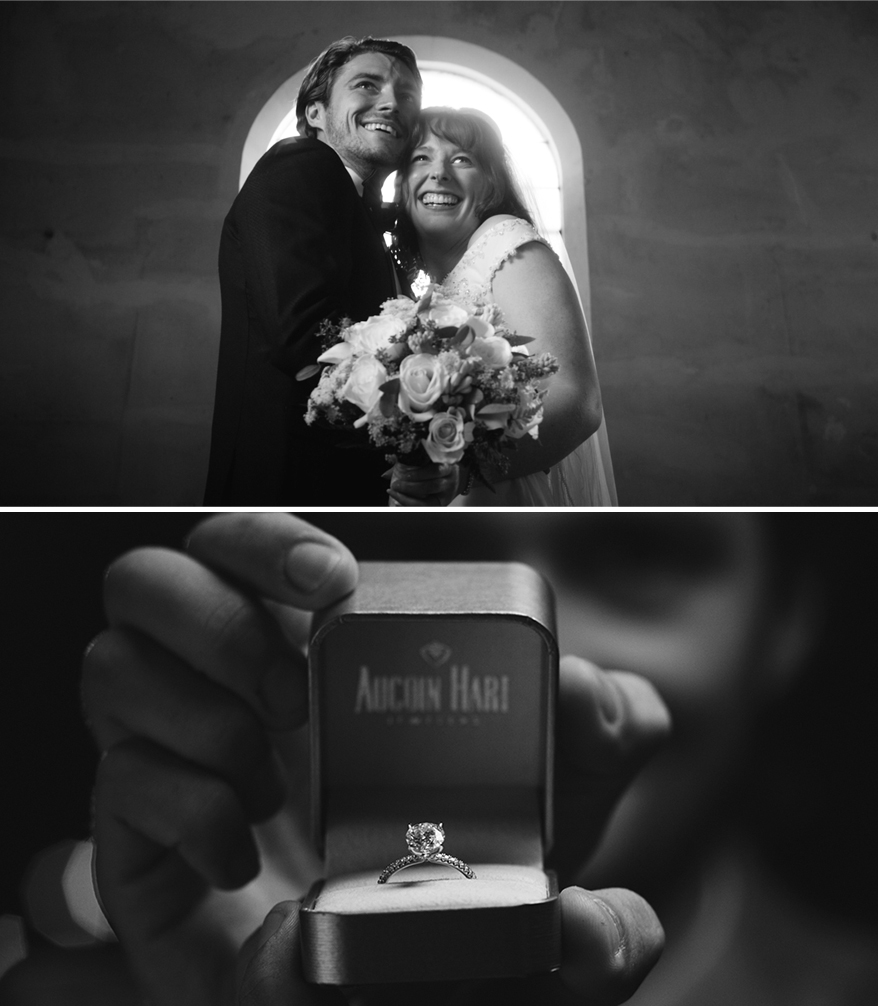
Aucoin Hart’s recent TV ad, which uses the French language exclusively and was shot in black and white, caused a stir in its local New Orleans-area market.
“We spent a lot of time with our ad agency [Brand Society of New Orleans] thinking about what makes us different. New Orleans is a very European city with a French heritage. We wanted to use the city as a backdrop. We also wanted to have a nod to our French heritage and be memorable, be iconic.”
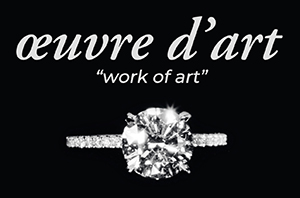 Taking inspiration from French films, they opted for a cinematic approach. The agency was on board with telling a cinematic love story. But what they proposed seemed completely off the wall.
Taking inspiration from French films, they opted for a cinematic approach. The agency was on board with telling a cinematic love story. But what they proposed seemed completely off the wall.
“They said, ‘We want to shoot it in black and white and we want to shoot it in French.’ I was like, ‘Wait a second, this is not going to work!’” Aucoin recalls. “My dad, who is still involved in the business, said, ‘No way!’”
The agency explained that the slogan would be in English, but that a love story could be understood in any language, and that having that language be French would be memorable, particularly with a romantic musical soundtrack.
A client focus group thought that having the commercials be a mix of French and English would make it sound more like a language lesson than a love story. So, they went with the idea of a French language commercial shot in black and white. But prior to the big Thanksgiving 2022 launch, Aucoin says, everyone was nervous.
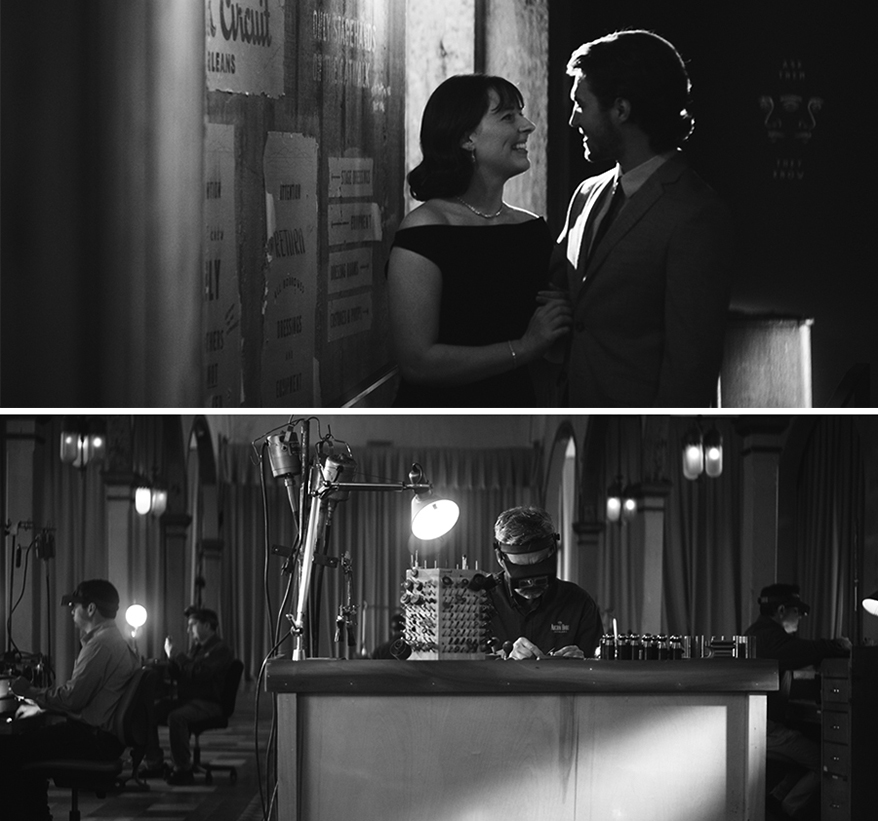
“The first commercial we launched was a bridal commercial, because everybody can relate to it. Engagement, anniversary, Christmas, are all about love and care and emotion.
“The feedback from the beginning was that it hits a cord with everyone and pulls an emotional string; it makes them smile.”
Longtime customers said they loved it (“they called, came in and emailed to tell us”), but the commercials, reinforced by radio ads in two languages, and social media, also are now regularly pulling in new customers. “When we probe and ask, ‘What brought you in,’ referrals are always No. 1, but even if it’s a referral, a close second was, ‘We saw your commercial and we love it.’ And if it’s not a referral, it’s a commercial.”
“We now know that this is the very base of this campaign that has legs for many years,” Aucoin says.
Advertisement
Steven Singer Jewelers | Philadelphia, PAI Hate Steven Singer

Steven Singer
When Steven Singer first introduced his now famous “I hate Steven Singer” marketing campaign to Philadelphia, it was designed to seem like someone really was trying to destroy his reputation.
The message looked like it was scrawled by graffiti artists on the Steven Singer Jewelers storefront. Everything else from the website to voicemail appeared to have been hacked or destroyed by hostile forces. Singer had kept the plan to himself and did everything in the middle of the night, using stick-ons that looked like graffiti paint for the windows. “There were rumors I was a drug dealer or cheating on my wife, which is what I wanted,” he recalls. “Nobody knew what was going on.”
After Singer appeared on the Howard Stern radio show, which had just expanded its reach from New York to Philadelphia, it became clear the hate campaign was self-inflicted.
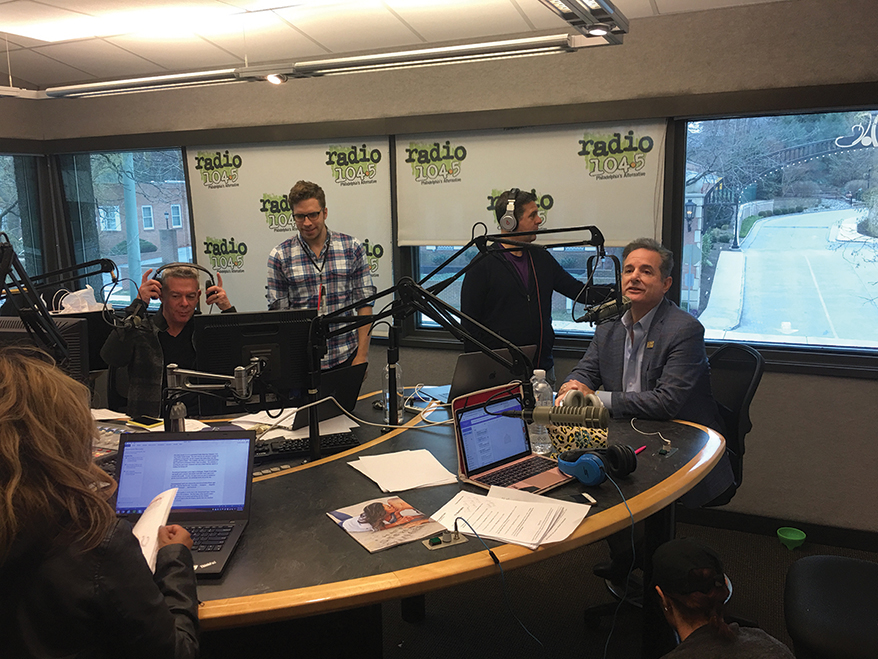
Since that auspicious beginning, he’s continued to make the most of “I hate Steven Singer,” proclaiming that message on banners, billboards and radio spots.
In 20 years, he’s given away at least 10,000 “I hate Steven Singer” T-shirts. Other swag includes a pencil with an eraser on both ends, post it notes that are black; golf balls that are green and bottomless coffee cups. Pre-pandemic he was famous for events, including the world’s largest bubble bath; he was also the principal sponsor for the largest indoor eating contest, which drew 24,000 people.
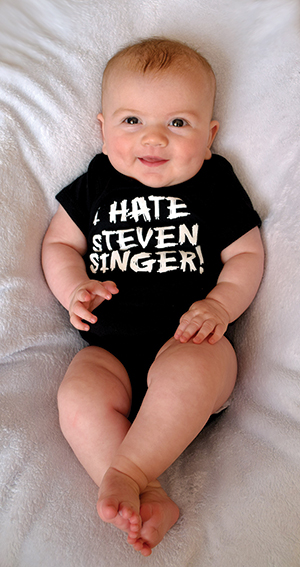 Singer has spoken at industry events, communication and marketing classes, small businesses and chambers of commerce around the country.
Singer has spoken at industry events, communication and marketing classes, small businesses and chambers of commerce around the country.
The concept and the national advertising (radio and billboards) in which he’s invested have helped his business grow exponentially. Sixty staff members work in the store and more than 100 work remotely on e-commerce. “We have a real online business,” Singer says. “We have people who do live chat with customers. We don’t farm it out or have a call center. It’s usually people who have worked in our store previously.”
The online business a decade ago was 50/50 with the store. Now online is four times the size of brick-and-mortar and continues to grow. “We’re not anywhere near any kind of a ceiling,” he says.
Steven Singer is the longest running continuous advertiser on the Howard Stern Show since Stern made the move to Philadelphia, the only advertiser who is a jeweler and the only sponsor who has appeared on the show. “I’m very lucky to be a part of that,” Singer says. “Very lucky to ride on his coattails.
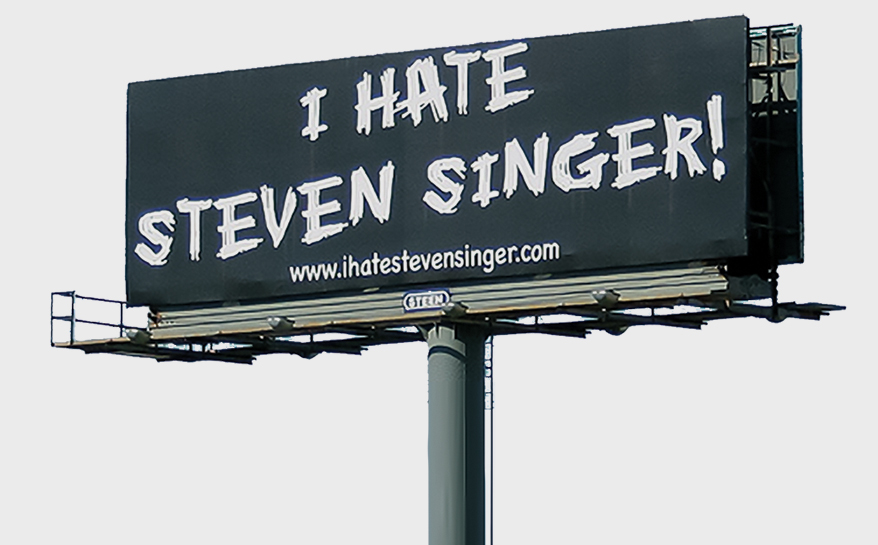
For the last 20 years, retailer Steven Singer has used the “I hate Steven Singer!” tagline as an ironic and catchy message that has made him a household name in Philadelphia.
The branding idea was inspired by a customer who hadn’t bought any jewelry for his wife since he gave her an engagement ring. Twenty years later, for her 40th birthday, he purchased a diamond ring from Steven Singer and threw her a surprise party. The wife’s response to the birthday gift and party was enthusiastic, and nine months later, the couple, who had two adult children, were in the store with news of a new baby. The wife said she was very pleased with her jewelry and said “I love Steven Singer Jewelers!” The husband joked, “I hate Steven Singer! We’re up all hours with midnight feedings and diaper changes.”
And with that baby, a legendary marketing campaign was born.
Britten Wolf BVW Jewelers | Reno, NVExtraordinary, Never Ordinary

Britten Wolf
Britten Wolf of BVW Jewelers in Reno, NV, says he doesn’t want to be “the guy yelling from a bully pulpit” about racism, diversity and inclusivity, but he does emphasize as strongly as possible that everyone is welcome in his store.
“Having two gay sons, I get to see all that (discrimination) firsthand. And I’m lucky enough to be in a diverse family, where I have black step-kids.”
The first commercial he made in 2016, a 30-second spot shown in local movie theaters, emphasized that love is love no matter a couple’s gender or sexual orientation. He received overwhelmingly positive reactions to the ad, in which two young women become engaged with a traditional diamond ring from BVW Jewelers and celebrate their love and commitment with a kiss. The first weekend it appeared on social media, it generated more than 20,000 impressions on Facebook, YouTube and Instagram. The day after it ran, a couple came in after seeing the video and paid for the commercial by ordering custom rings.

Reno-based BVW Jewelers’ recent commercial focuses on a black family drawn to Nevada during the Gold Rush.
“And we were considered edgy,” he says. “I don’t see it as edgy. I see it as realistic.”
He recently teamed up with Bryon Evans Films and ADJ Visions production Co. to make a commercial for regional television, with the theme of the universality of family heirlooms. The narrative focuses on a black family drawn to Nevada during the Gold Rush, who face discrimination throughout generations of their history, but pass down a cherished piece of heirloom jewelry.
“We wanted to tell a story that was based in love, while still acknowledging the past and the legacy of those that came before us,” says Darius Devine, director, co-writer, and co-producer.
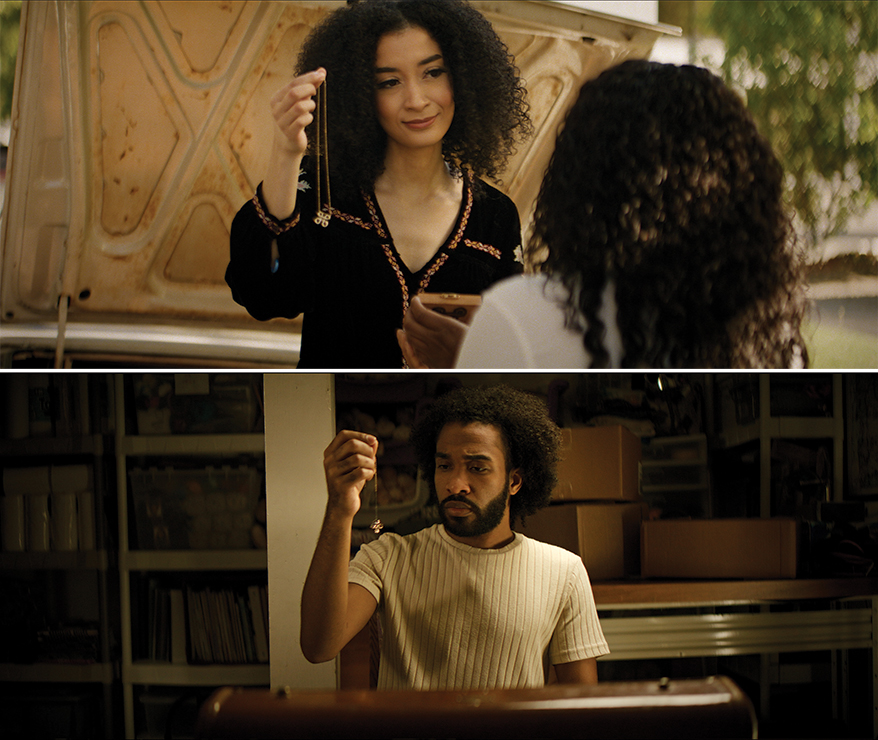
“Black families have historically been excluded from the fine jewelry market, and with that means often a lack of family heirlooms,” says Wolf. “We wanted to honor the importance of family legacies and share the message that jewelry is for everyone — it’s not just about romantic love, but celebrating family love, people of all races, and love for all genders and identities. All people experience love, and we support the representation of love for all people, including those who have often been underrepresented, like people of color and LGBTQIA+ people.”
The heirloom piece shown in the video is the West African “Mpatapo” symbol or the “knot of pacification and reconciliation.” Mpatapo represents the bond or knot that binds parties in a dispute to a peaceful, harmonious reconciliation. The goals for this commercial include honoring the history of black ancestors while shifting the narrative to share new stories of hope and positivity for the future.
Advertisement
Koehn & Koehn Jewelers | West Bend, WIRock Your World

Andy Koehn
Andy Koehn’s “Buy Like a Guy” podcast has been a process of trial and error for Koehn & Koehn Jewelers of West Bend, WI. In the beginning, he thought promoting his podcast on social media with revealing photos of beautiful women was the way to go, but now he says he was “dead wrong.”
In fact, he’s been so dissatisfied with his original podcasts that he deleted them and started over. “So much of what I was doing at the beginning was wrong. Titles were terrible, sound quality sucked. I started on my phone and just thought this would be fun.”
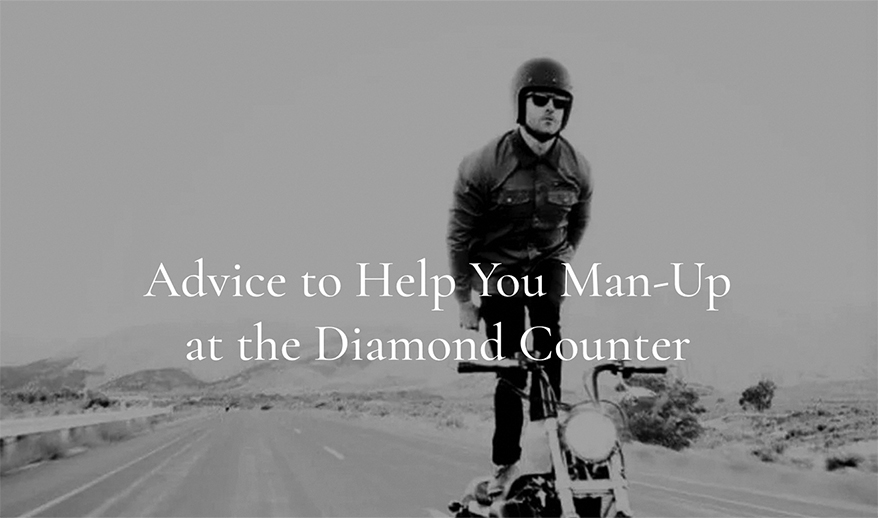
But he’s upgraded the production quality, resolved those technical issues and is confident that the original idea of appealing to regular guys who are not at all comfortable in jewelry stores is a valid marketing concept. He keeps most of the podcasts to five minutes.
“I would hear the same questions over and over again from guys when they were looking for engagement rings,” he says. “They care about jewelry when they need it, and other than that, there’s not a deep interest in knowing more about it. Jewelry stores are so foreign they don’t know what to do and they get a little freaked out. The No. 1 fear is they’re going to get something that she’s not going to love.”
Koehn set out to answer these questions and clear up those concerns in the form of the podcast, which has a casual, conversational tone, as if he’s been asked by the guy sitting next to him on a barstool what he should look for in a diamond. So he doesn’t avoid “swear words” when they seem to be a natural part of the conversation, and he uses humor when appropriate.
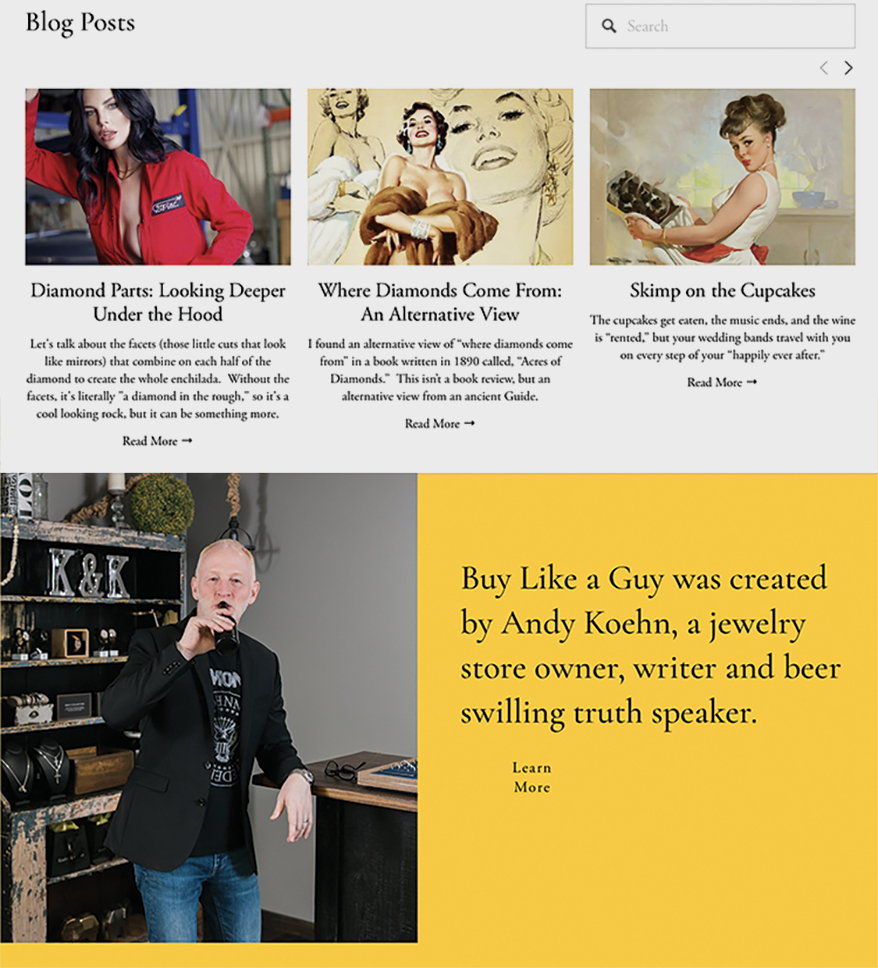
He’s also invited guests, including a local business owner, to join him on the podcast. “The subject was ‘what you hate about jewelry stores.’ And he’s the one that put it in my brain, that ‘this is a lot of money to spend, and I want to make sure she is going to be happy.’”
Often, it’s women who find the podcast first and make sure their significant others watch it. “I have gotten sales off of the podcast,” he says. “It’s nice to see your marketing work.”
Alara Jewelry | Bozeman, MTDang, We’re Good!

Babs Noelle
In 2015, Babs Noelle of Alara Jewelry in Bozeman, MT, advertised her clearance event as a divorce liquidation sale, which, in truth, it was. She had decided to liquidate her assets to reach a divorce settlement. Exterior signage included three big yellow banners that announced: “Public Notice Divorce. Everything Goes. Up to 70 Percent Off!” Catchphrases included: “Help me wash that man right outta my hair!” and “We’re liquidating the assets and splitting the sheets!”
“It was honest,” Noelle says. “It was simple. It was transparent. People know what a divorce is, and many know what kind of financial havoc it can wreak.
“I’ve had customers bring in out-of-area visitors, and they tell the story about it, right here in the store. Usually, their comments are peppered with compliments indicating they think I’m a marketing genius. I always take the opportunity to tell them, my decision to come out and call it a Divorce Sale was actually about being transparent and authentic, because who doesn’t like their jeweler to be both of those?”
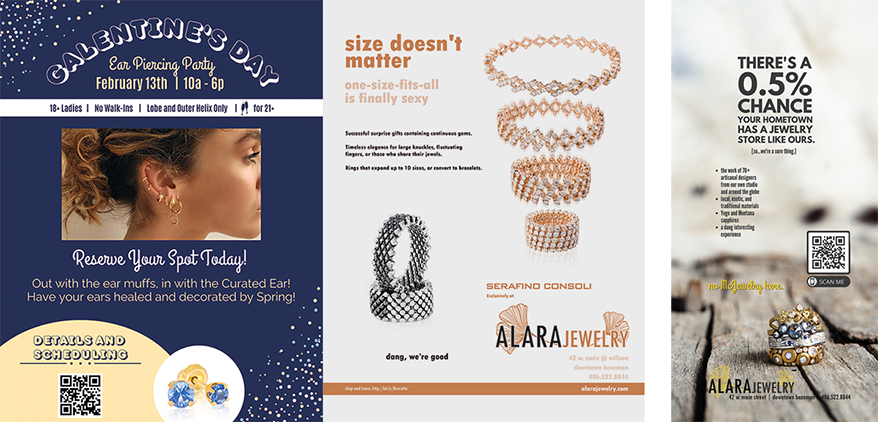
Alara Jewelry’s advertising almost always features tongue-in-cheek copy designed to highlight the store’s approachability.
Still, her most successful advertising campaign has been waged in the public restrooms of Bozeman. “All the time, I get people from restroom advertising,” she says. “The bathroom ads have continued to be an awesome source of business, and we love that we can separate the ads by men/women. The #MeToo movement has certainly meant that we’ve tiptoed away from some of our racier themes.”
She also advertises on the back cover of the local downtown directory. “Nearly every tourist to downtown Bozeman grabs one of these. It’s more cheeky than edgy, although the bragging is a bit in your face.”
Thacker’s Jewelry | Lubbock, TXA Bridal Showdown

Joe Thacker
Joe and Ann Thacker’s West Texas jewelry store is in Lubbock these days, but the heart and soul of their business is 75 miles away in dusty Roaring Springs (pop. 214), where the company was born, where its jewelry factory remains, and where Joe’s family has had a presence for 130 years.
So, it made sense to return to Roaring Springs to film an idiosyncratic commercial. In “Bridal Showdown,” brides-to-be show off the size of their Thacker engagement rings in scenes reminiscent of a Western movie. A voiceover declares Thacker’s Jewelry the finest and fairest “this side of the Mississippi.”
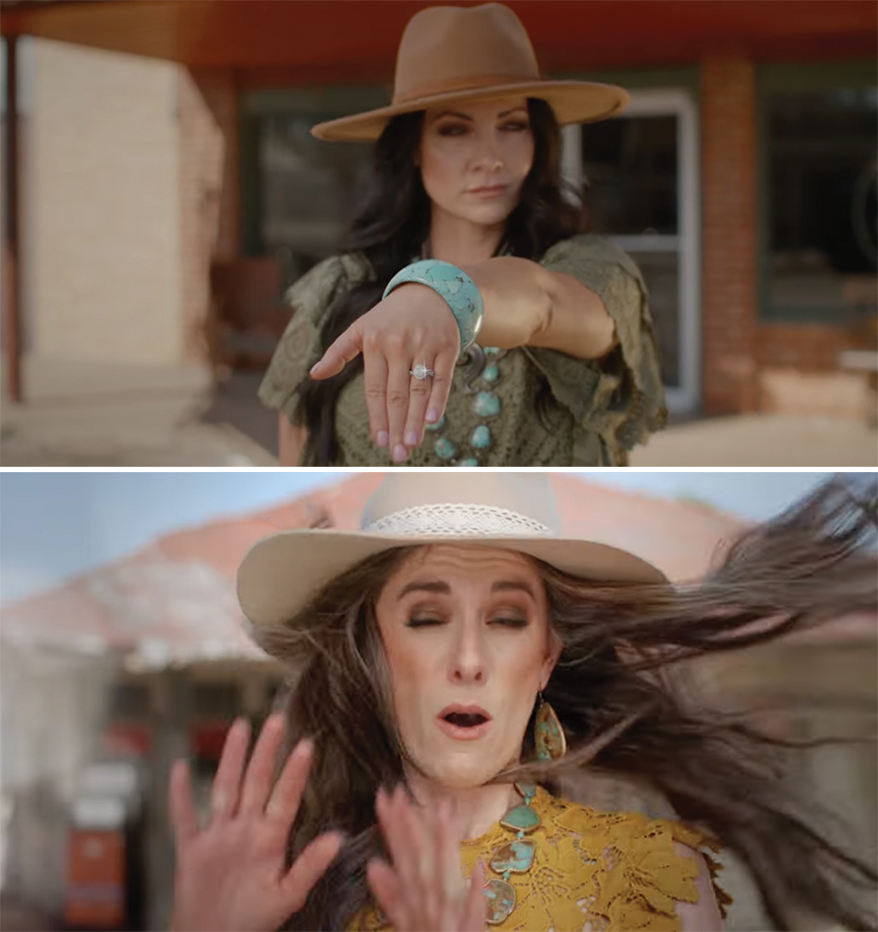
Thacker’s Jewelry’s “Bridal Showdown” commercial borrows on themes made famous in Wild West films.
Thacker says it perfectly reflects the vibe of the store and the history of the business.
“We have partnered with Bottom Line Marketing for a number of years, and after years of getting to know us and our area of Texas, the team at Bottom Line worked with us to come up with these commercials,” Thacker says. “The commercials were a hoot to do and have been received very well in our market. West Texas to me is still old Texas. Big cities are not Texas, in the sense of the Old Texas. My family was in business in hardware, furniture and farm supply in Roaring Springs for 80 years. It’s about that small-town friendliness.”
While Thacker’s has a jeweler on staff and a shop for general bench work at the Lubbock location, custom work (both hand carving and CAD/CAM) is done at their factory in Roaring Springs. Before going to work for Thacker’s, two of the bench jewelers were working cowboys with artistic leanings.
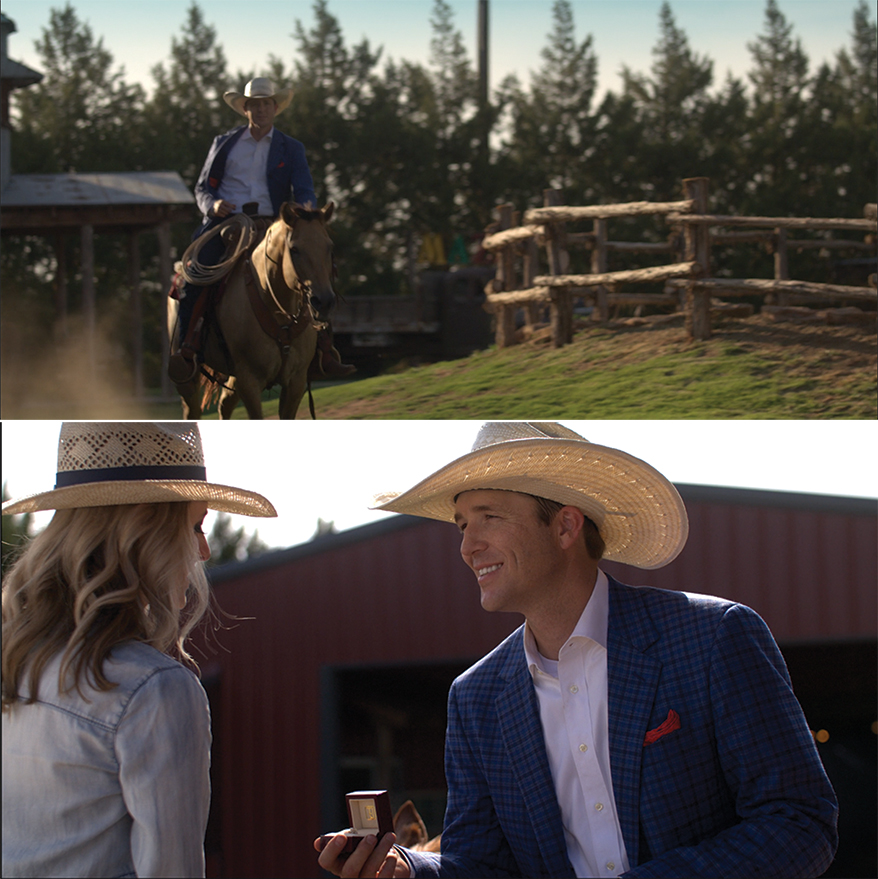
The Thackers offer curious clients a behind-the-scenes education.
“If you get lost and you happen to find yourself in Roaring Springs, we do give tours of the factory,” Joe says. “It’s very much off the beaten path, and you have to be going there or going to another small community to pass through it. But it’s amazing that busloads of people will go there to tour the factory, to see the gold poured, to see them setting diamonds.”
Jackie Brooks, owner of Bottom Line Marketing, says the concept for the commercial came from a visit to Roaring Springs and her own tour of the factory. “Thacker’s is not like your normal jewelry store,” she says. “We wanted to feature girls who are proud to wear their engagement rings from Thacker’s. They’re local and they wear cowboy boots, and they want a big ring. It’s who their customer is.”
Size is definitely a priority for those customers. Thacker’s sells 3- and 3.5-carat lab-grown diamonds as well as mined diamonds.
Advertisement